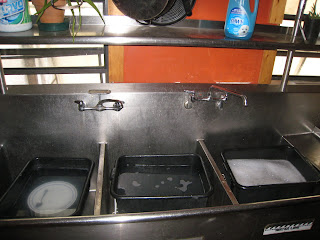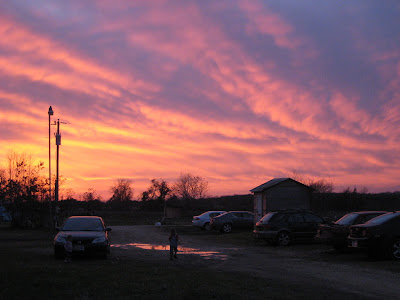The Farm's annual MLK urban gardening community service day was a success. All the people here on the farm went to one of six different sites and worked on an urban garden. I was posted at Lakeview Church with one of the Americorp volunteers Lucas. We were in charge of tilling and planting 14 rows of a variety of potatoes, onions, collard greens, and flowers. Tilling is done prior to planting and involves breaking up the soil to make it easy to plant things and, in turn, aerates the soil allowing for the nutrients to be exposed to the plant roots. We had about 54 volunteers show up with ages ranging from toddlers to grandparents. Making sure that everyone followed our instructions was no easy task. The kids wanted to plant everything about twice as dense as it should have been. We eventually got everyone on the same page and finished the rows. It was nice to talk to the volunteers and hear what they had to say about the farm and its impact on the community. One man made a comment that he wished there were more spots available in our community sustained agriculture (CSA) program. CSA is a program where local families in the community pay a monthly fee in exchange for a basket of fresh vegetables every week. The main advantage of this program for the farmer is the guaranteed sale of their vegetables. My response to him was that the best way to increase the amount of spots is to have more farms participating in this program! Something else we had at the same time was mural painting. I had a picture of a mural on my last post. Volunteers that didn't want to get their hands dirty were able to paint the mural at their site where most all of them would end up when completed. Unfortunately I left my memory card in my computer so I wasn't able to take pictures (epic fail on my part) but each one had pretty crazy colors.
That night there was a potluck at the directors house on the farm. Most everyone brought something delicious. I took a picture of the best part...

It was nice being around the directors family and some of the old volunteers that now live in Waco. There are also some older folks staying here, all of which I would gladly have as my grandparents. Having them around is a kind of symbiotic relationship: we make them feel young again and they amaze us with how upbeat and handy they are. We have a lot of broken equipment that has been sitting around the farm. One of the guys fixed three machines in this past week and helped to pull a chicken coup out of the ground. This was a great MLK day.


The rest of the week was filled with weeding, tilling, planting, and milking! Most of the live-in volunteers spent the week weeding and tilling in preparation for planting carrots and onions. We milk our goats twice a day and put it up for sale in our farm store. We all get to do this once a week on either shift. Milking the goats is fun but there are a lot of procedures that must be followed to ensure the quality and safety of the milk. The equipment has to be sanitized as well as the goats themselves. We have to clean the udders to ensure that nothing harmful will drop into the milking pale and prevent the goats from kicking during the milking process. I finished milking my first goat, turned to the other volunteer helping me to tell him I was done and the goat decided to kick the bucket getting dirt and other bacteria into the pale rendering the milk useless (I think the goat was out to ruin my farm cred)! I'll be the first to admit that touching a warm teet on a cold day feels really good...just throwin' that out there.
In continuing the tour de farm...
There's a pen that leads to two fields where we keep the dry goats (dry meaning non-milk producing). Feeding goats is no challenge. As unintelligent as they are, the one thing they respond to is food. There is a piece of PVC pipe that works to hold the feed at about mouth level allowing us to distribute the feed easily. I helped one of the interns feed them. When we walked over to the fence, they immediately jumped on the pipe to get a few feet closer to the top of the 8 foot tall fence (still no where near high enough to jump it) breaking the pipe off the fence. Now, we had to go into the pen to feed them. I went in first as the diversion luring them towards me with an empty bucket. It was only a matter of a minute until they had caught on to our little game. Unfortunately this was not long enough for my partner in crime to get the feed dumped off. This forced him to dump the entire bucket onto the ground leading to the great WHRI goat scrum!

It was a very violent moment in the farm's history. No goats were harmed during the taking of this picture.
Across the road from the dry goats are two chicken coops with about 50 chickens that is surrounded by a nylon fence.

One of the sustainable practices here at the farm is to have the chickens moved every few days to expose them to new grass and allowing the old grass to recover. The chickens eat and fertilize the grass all the while laying eggs in their coops. By the time the coops are moved back to the section they started at the grass is strong and full of nutrients. Their diet is supplemented with a mix of feed, corn, and oyster shells as well as scraps from our meals. The eggs are sold in our store and, if there are enough eggs, some get put into a fridge for farm use. During the winter months egg production slows down due to the lack of sunlight. In order to trick the chickens into thinking that it is later in the season than it is there are lightsplaced in the coops that come on around 4 immitating extra sunlight. This helps to increase the egg yield. Now I know why the chicken crossed the road.
Another sustainable practice that is done here that I like is the dish washing system. We have a lot of people here on the farm that eat lunch and only a few people clean all of the dishes after each meal. Having an electric dishwasher isn't worth the time or effort. Instead, everything is washed by hand. The method that is implemented involves filling up large tubs with water to prevent the faucet from being on the entire time.

The first bin has warm, soapy water, the second bin has hot tap water used to wash off any soap, and the third bin has water with some bleach. This system works to get the dishes clean and sanitized while saving a great bit of water not to mention money.
There are several weekly activities that occur on the farm. Two of them are male and female bonding nights; The female bonding night is called 'stitch and bitch' and the male bonding night is called 'man cave'. Last night I attended my first man cave session...it was epic. There was some drinking and a lot of unspeakable man things...like eating apple pie.

On a personal note, I managed to get my road bike in working condition and took it to the local H.E.B. (a Texas grocery store). I had heard some horror stories about people getting hit here so I was careful when crossing under freeways and major streets. I also tried my hand at some archery. I may be color blind but I have deadly accuracy.

After being out here for a week, I can say I'm truly amazed at the amount of farm related conversations people have. This stems directly from the resources and experience that has been compiled over the years. I hope to share some insight into farming resources in coming posts.

I participated in the MLK Day of Service too. My fellow Americorps members and I went to the Bronx where we met up with City Year and Americorps volunteers from all around New York. I was assigned to painting banners promoting literacy and finished a smashing image of Frog and Toad.
ReplyDeleteI think I would enjoy the Man Cave better than Stitch n Bitch. Is there sewing involved? Y'all seem too progressive to confine your sisters to such gender norms (like my Texas talk?).